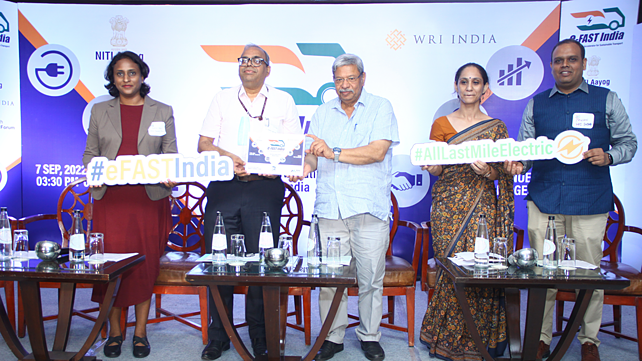
Nearly 71% of all freight transported in the country today is completed by road. In fact, freight activity is expected to increase five-fold by 2050, corresponding to a vehicle stock of about 50 million. Worryingly, studies have estimated that if left unchecked, freight emissions could grow to over 1,214 million tons by 2050 — a staggering 451% increase from 2020 levels.
In light of these developments, India’s first national electric freight platform – the Electric Freight Accelerator for Sustainable Transport – India, or e-FAST India, was launched earlier today by NITI Aayog, in collaboration with World Resources Institute (WRI) India, and supported by the World Economic Forum, CALSTART and RMI India.
The objective of the e-FAST platform is to bring together different stakeholders from across the freight ecosystem, to strengthen partnerships and identify and support innovative freight solutions, a release issued by the apex public policy think tank of the Government of India said.
e-FAST India aims to raise awareness on freight electrification, supported by on-ground demonstration pilots and evidence-based research. In addition, the platform will also support scalable pilots and inform policies aimed at accelerating freight electrification in India.
Speaking on the occasion, Sudhendu J Sinha, Advisor (Infrastructure Connectivity & E-Mobility), NITI Aayog, said the freight sector, which plays a key role in India’s economy, sustained its growth during the COVID pandemic, despite disruptions, ensuring a steady movement of essential goods and medical supplies across India.
Dr Surendra Ahirwar, Joint Secretary, Department for Promotion of Industry and Internal Trade (DPIIT), said, “With India being the third-largest truck market, after China and the United States, early adoption of zero-emission trucks would be instrumental in not only accelerating domestic climate imperatives but also in supporting global climate action.
Road freight is a high-impact area for reducing transport emissions, said Dr OP Agarwal, CEO, WRI India. “Expanding fleet sizes and operations, with its implications on greenhouse gas emissions and fuel price volatility, underline the imperative to transition to electric freight,” he said.
Meanwhile, NITI Aayog and Rocky Mountain Institute (RMI) also released a report during the event that highlights how India can capture the far-reaching benefits of a zero-emission trucks (ZETs) future through a blend of technology advancement, innovative business models, policy, and financing.
Even WRI India unveiled its Total Cost of Ownership (TCO) Evaluator, which is an intuitive excel-based application that can analyse cost components and performance parameters of light/ medium/ heavy-duty freight, and compare electric variants with its diesel/ petrol/ CNG counterparts, to identify their impact on TCO per km.
Also read:
Freight Trucking Market Size To Grow At 3% CAGR Till 2027
Maersk Enters Into Air Freight To Offer Integrated Logistics